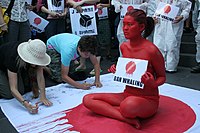
Photo from wikipedia
Professional societies, especially international ones, are strengthened by including a diversity of members from a variety of communities. The International Primatological Society as well as other societies have recognized the… Click to show full abstract
Professional societies, especially international ones, are strengthened by including a diversity of members from a variety of communities. The International Primatological Society as well as other societies have recognized the importance of these strengths by forming new committees dedicated to issues of equity, inclusion, and diversity. Yet it is imperative that such efforts move beyond checking the boxes for how many different groups of people we have in our membership toward institutional changes that transform the society and create safe inclusive spaces where everyone who wishes to join can fully engage in the work of the society. For many communities, their engagement will require that societies recognize and address how those communities have been or continue to be marginalized from the society. It will mean questioning the institutional systems and structures that continue to reflect and privilege Western worldviews over others. It will mean decolonizing science and practice. I am a primatologist who focuses my research and practice on primate conservation efforts. While I enjoy my work and find it rewarding, I have often felt divided between my professional and personal selves in spaces where primate conservation occurs or is discussed and planned. Although I work and have been educated at elite research institutions in the United States, I have an indigenous ethnic background that is very distant from these institutions. My extended family are Saami nomadic reindeer herders who live north of the Arctic Circle in Sweden and Norway. Saami livelihoods are threatened by climate change as well as infrastructure development for vacation homes, energy plants (wind/water), mines, and petroleum terminals within traditional herding grounds. As Saami are stewards of pastoral tundra ecosystems, their interests may be in line with the goals of many biodiversity conservation projects. However, the Saami, like many other indigenous peoples, have experienced systematic oppression and forced assimilation, as well as dispossession of land and livelihood not only for https://doi.org/10.1007/s10764-019-00093-y
Journal Title: International Journal of Primatology
Year Published: 2019
Link to full text (if available)
Share on Social Media: Sign Up to like & get
recommendations!